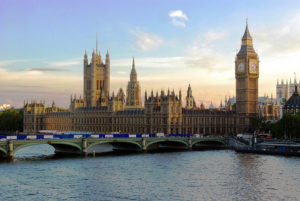 The Prime Minister has today announced a new ambitious target to reduce the UK’s emissions by at least 68% by 2030, compared to 1990 levels.
The Prime Minister has today announced a new ambitious target to reduce the UK’s emissions by at least 68% by 2030, compared to 1990 levels.
Recognising the urgency to go further to tackle climate change, the UK’s new target to reduce greenhouse gas emissions – our Nationally Determined Contribution (NDC) under the Paris Climate Agreement – is among the highest in the world and commits the UK to cutting emissions at the fastest rate of any major economy so far.
Today’s target is the first set by the UK following its departure from the EU, demonstrating the UK’s leadership in tackling climate change. Over the past decade, the UK has cut carbon emissions by more than any similar developed country and was the first major economy to legislate for net zero emissions by 2050.
The announcement comes ahead of the UK co-hosting the Climate Ambition Summit on Saturday 12 December, which will coincide with the fifth anniversary of the historic Paris Agreement. The summit calls on countries around the world to submit ambitious NDCs or other climate plans as we head towards the UN COP26 climate talks, which the UK government is hosting in Glasgow next year.
This new target meets the recommendation of experts at the independent Climate Change Committee who advise the government on emissions targets.
The UK’s path to meeting this target is backed by the Prime Minister’s Ten Point Plan for a green industrial revolution, which will create and support up to 250,000 British jobs by 2030. The plan sets out ambitious policies and investment, with the potential to deliver over £40 billion of private investment by 2030, so that we can develop innovative technologies and make significant strides in cutting emissions across energy, transport and buildings. It also provides a roadmap of further action the UK will be taking to reduce emissions in the coming decades, encouraging similar levels of ambition from businesses, organisations and nations around the world.
Prime Minister Boris Johnson said, “We have proven we can reduce our emissions and create hundreds of thousands of jobs in the process – uniting businesses, academics, NGOs and local communities in a common goal to go further and faster to tackle climate change.
“Today, we are taking the lead with an ambitious new target to reduce our emissions by 2030, faster than any major economy, with our Ten Point Plan helping us on our path to reach it.
“But this is a global effort, which is why the UK is urging world leaders as part of next week’s Climate Ambition Summit to bring forward their own ambitious plans to cut emissions and set net zero targets.”
Each party to the Paris Agreement – including countries and international blocs such as the European Union – determines what domestic action it will take and communicates it in a Nationally Determined Contribution.
NDCs are at the heart of the Paris Agreement goal, set at COP21 in 2015, to hold the global temperature rise to well below 2 degrees and pursue best efforts to limit the increase to 1.5°C.
Together, these plans will determine whether the world will achieve the long-term goals of the Paris Agreement, including global peaking of greenhouse gas emissions as soon as possible.
Many countries have now made net zero commitments and this round of NDCs, which set a 2030 emission reduction target, will need to be consistent with those longer term commitments. The UK’s announcement, which reflects the independent Climate Change Committee’s advice on net zero, does just this.
Today’s announcement comes ahead of the UK co-hosting a virtual Climate Ambition Summit on 12 December, which will coincide with the fifth anniversary of the historic Paris Agreement.
The Climate Ambition Summit provides a platform for leaders who are ready to come forward with announcements of new, more ambitious nationally determined contributions and long-term strategies to net zero, as well as new climate finance pledges and ambitious adaptation plans.




Unfortunately the PM’s 10-point plan is just a list of good intentions, there is no tangible evidence that new carbon emission reduction projects are being funded now. Considering that the UK is way behind the curve in actual implemented measures compared with many countries, especially Europe, there is a long way to go to catch up before COP-26 in Glasgow, which is in less than a year away